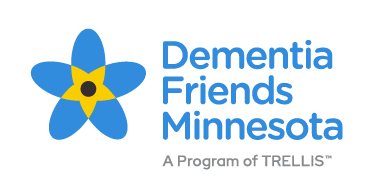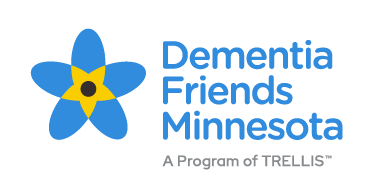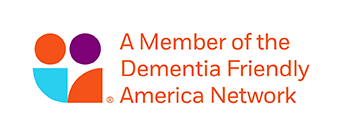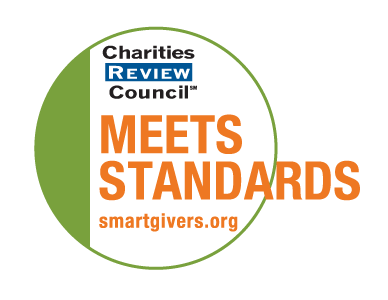Dementia Friends Interview: Maby Almiron
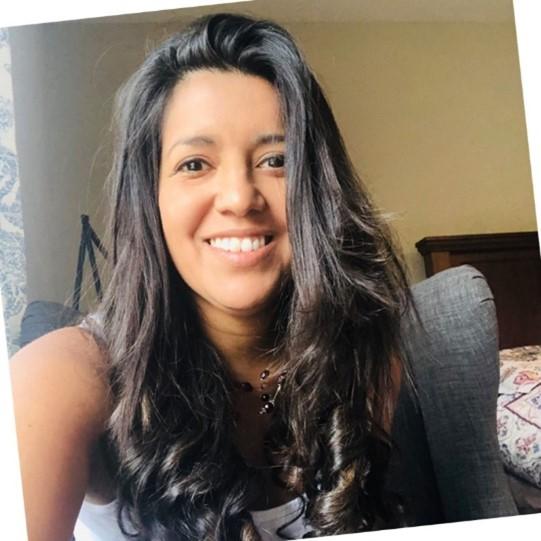
Para celebrar el décimo aniversario de Amigos de la Demencia de Minnesota, cada mes estaremos presentando a un Amigo que ha llevado el trabajo a nuevas alturas. Este mes, hablamos con Maby Almirón, especialista en Alcance Comunitario en Trellis, quien facilita sesiones de Amigos de la Demencia, en español, alrededor del área metropolitana.
To celebrate the tenth anniversary of Dementia Friends Minnesota, every month we will be featuring a Friend who has taken the work to new heights. This month, we spoke to Maby Almiron, Community Outreach Specialist at Trellis who provides Dementia Friends sessions in Spanish around the metro area.
¿Cómo utilizas Amigos de la Demencia como especialista en alcance comunitario?
Amigos de la Demencia es una de las presentaciones que puedo ofrecer a la comunidad. Cuando me convertí en una Campeona por primera vez, estaba feliz porque ya era capaz de encontrar todos los recursos en español.
Por mi experiencia, la demencia lleva a la confusión muchas veces porque la gente dice: ‘Alzheimer o Demencia, ¿qué es?’ Es lo mismo, pero, ¿cuál es demencia? ¿Cómo lo sé? Y (los materiales de Amigos de la Demencia me ayudaron a entender con los ejemplos que tenían. Diferentes tipos de ejemplos para que la gente que reciba el mensaje en diferentes vías. Algunas personas lo harán escuchando, otras personas leyendo, o visualmente. Así, cuando puedes enseñarles la estantería, por ejemplo, en Power Point, es como, ¡oh! Tener esos objetos visuales ayuda.
How do you use Dementia Friends as a Community Outreach Specialist?
Dementia Friends is one of the presentations that I am able to offer to the community. When I first became a Champion, I was happy that I was able to find all the resources already in Spanish.
In my experience dementia brings a lot of confusion because people say, Alzheimer’s or dementia, what is it? It's the same, but what is dementia? How do I know? And [the Dementia Friends materials] helped me to understand with those examples that they have. Different kinds of examples for people who receive the message in different ways. Some people might be by listening, some people might be by reading, or visually. So, when you can show them in a PowerPoint the bookshelf example, it's like, oh! Having those visual things is helpful.
¿Dónde haces esas presentaciones?
Ahora mismo, yo llevo Amigos de la Demencia en su mayoría a las iglesias… iglesias latinas o hispanohablantes… de las que hay muchas. Me gustaría reclutar a más Campeones [hispanohablantes] así, ellos pueden hacer presentaciones. Porque siendo una sola persona, estoy muy limitada.
Where are you doing these presentations?
Right now, I do [Dementia Friends] mostly in churches...Latino or Spanish speaking churches, which we have a lot of. I would like to recruit more [Spanish-speaking] Champions so then they can do presentations, because as one person, I am limited.
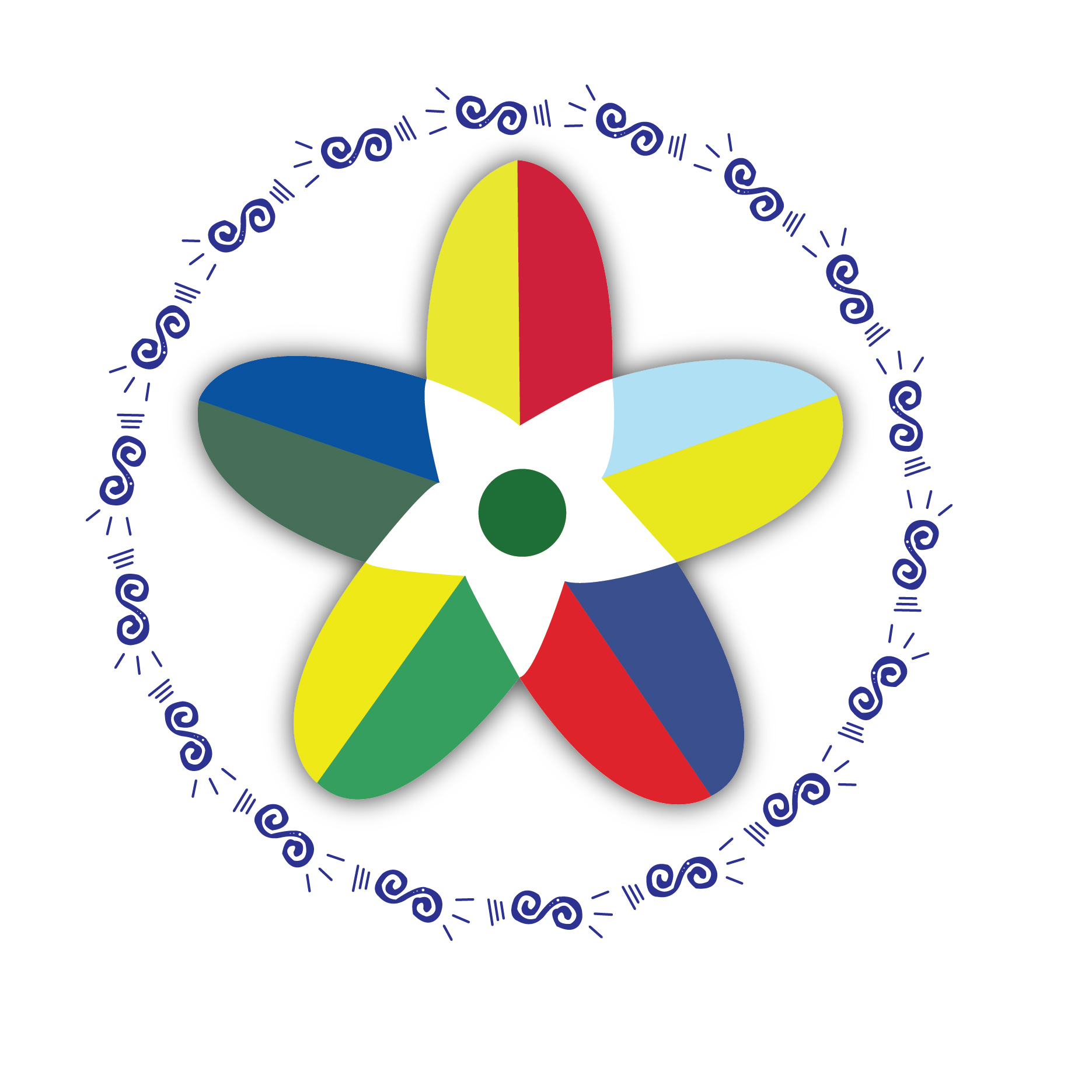
¿Qué consejo tienes para la gente que quiere hacer la presentación para su comunidad?
El consejo que puedo dar a otros Campeones es traer una mente abierta a cada presentación. No es lo mismo en cada lugar. Siempre es diferente. Diferentes situaciones, diferentes ejemplos. Ellos me consultarán por diferentes consejos. Tienes que estar preparado y traer mucha empatía.
Además, si pueden aportar historias que hayan escuchado, será útil porque a veces no se trata de aprender del libro, sino de usar ejemplos reales. Sigan la newsletter de Iniciativas Comunitarias de Amigos de la Demencia y las presentaciones de la Comunidad de Aprendizaje, y busque consejos, porque, a veces comenzamos solo con el conocimiento que tenemos y no agregamos más.
What advice do you have for other people who want to do presentations in their community?
The advice that I can give to other Champions is to bring an open mind to each presentation. Each place is not the same, it's always different. They have different situations, different examples, they will ask you for different advice. You have to be ready and bring a lot of empathy.
Also, if you can provide people with stories that you have heard, that is going to be helpful because sometimes it's not learning from the book but using real examples. Follow the Dementia Friendly Community Initiatives newsletters and the Community of Learning presentations and look for tips, because sometimes we start with only the knowledge that we have, and we don't add more.
¿Qué hace un Amigo de la Demencia como tú?
Sé que la gente puede hablar abiertamente sobre demencia en algunas culturas, pero cuando hablamos de la comunidad latina, [la demencia} es algo que es tabú. La gente no quiere hablar de ello. Es un secreto. Hay algunas personas que se encuentran en un estadio de negación.
Para mí, una comunidad Amigos de la Demencia sería como vivir en un centro, un sitio, un lugar, una comunidad donde la gente puede conectarse porque, oye, mi mamá también tiene demencia y yo he estado allí. Sé que ya tenemos esos en la comunidad blanca, tienes cuidado de la memoria, vida asistida, ese tipo de cosas. Pero cuando hablamos de nuestra comunidad, tenemos acceso a estos, pero normalmente no vamos a esos lugares. Se quedan en casa. Entonces, tener el espacio comunitario donde puedan conectar.
Minesota no tiene una gran comunidad de habla hispana, pero sé que la tendremos en el futuro y es fantástico que ya tengamos recursos de Amigos de la Demencia para esa población a medida que crece.
(Nota del editor: en 2020, el censo informó que 9,400 hispanos mayores de 65 años viven en Minnesota. Según MN Compass, más de 345,000 personas de ascendencia latina viven en Minnesota, lo que representa más del 6% de la población del estado. Si bien este total puede parecer modesto en tamaño, el crecimiento de la población latina en Minnesota ha sido bastante grande, aumentando un 38% desde 2010, en comparación con un crecimiento del 8% para el estado).
What does a Dementia Friendly Community look like to you?
I know that people can talk openly about dementia in some cultures, but when we talk about the Latino community, [dementia] is something that is a taboo. People don't want to talk about it. It's a secret. There's a stage of denial some people are in.
A Dementia Friendly Community to me would be like living in a hub, a site, a place, a community where people can connect because of hey, my mom has dementia as well and I've been there. I know that we have those already in the white community, you have memory care, assistant living, that kind of thing. But when we talk about our community, we have access to those, but we usually don't go to those places. We keep them at home. So, having the community space where they can connect.
Minnesota doesn't have a big Spanish-speaking community, but I know we will in the future and it’s great that we have Dementia Friends resources already in place for that population as it grows.
(Editor’s note: In 2020, census reported 9,400 Hispanics 65+ living in Minnesota. According to MN Compass, more than 345,000 people of Latino descent live in Minnesota, making up 6% of the state’s population. While this total may sound modest in size, Latino population growth in Minnesota has been quite large, increasing 38% since 2010, compared to 8% growth for the state.
Maby Almiron is a Community Outreach Specialist at Trellis. In her role, Maby connects organizations to resources for the aging and caregiver population, on the same time she learns about the community’s needs, and she brings support by visiting sites and meeting with the leaders of BIPOC organizations. She is passionate about life, opportunities, and different ways to give back to the Community.
Erika Herrera is a Colombian artist who moved to the USA in 2010. She loves finding inspiration everywhere she goes. She is very proud of her roots and enjoys spending time in nature, traveling, and creating. She created this month’s DF logo.
Maria Porteiro Cerisola provided the Spanish translation of the interview in her time as a Trellis volunteer.
